|
|

|

Six Nuts You May Not Have Heard of but Whose Nutrition & Taste You'll Love
by www.SixWise.com Nuts are quite possibly the "perfect" food: full
of nutrition, satisfying and portable. Grabbing a small handful
of nuts requires little effort on your part, yet their protein
will keep you going strong, and their healthy monounsaturated
fats are good for your heart.
In fact, in July 2003, the FDA approved the following health
claim for nut package labels:
"Scientific evidence suggests, but does not prove, that
eating 1.5 ounces per day of some nuts, as part of a diet
low in saturated fat and cholesterol, may reduce the risk
of heart disease."
Most of us are familiar with the traditional healthy nuts
-- almonds, walnuts, pecans, cashews -- because while there
are thousands of nut varieties, only a handful are available
commercially. Here are a few of the more unusual nut varieties
that you may very much enjoy.
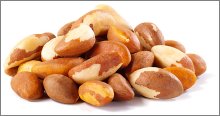 |
1. Brazil Nuts
These nuts have a tender texture and a mild flavor
-- and are grown on a large tree in the Amazon jungle
that can get up to 160 feet tall. Brazil nuts contain
protein, copper, niacin, magnesium, fiber, vitamin E
and selenium. Selenium
is a powerful antioxidant that works to neutralize dangerous
free radicals. A study at the University of Illinois
even found that the high amounts of selenium in Brazil
nuts may help to prevent breast cancer.
|
| |
|
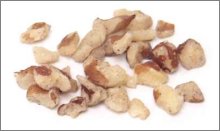 |
2. Black Walnuts
The rich smoky flavor of black walnuts is much stronger
than that of typical English walnuts. Their trees are
native to North America, and black walnuts were a staple
food to Native Americans and the early settlers. They
offer many of the same nutrients as English almonds,
including omega-3 fatty acids, which have been found
to protect the heart, promote better cognitive function,
and provide anti-inflammatory benefits for asthma, rheumatoid
arthritis, eczema and psoriasis.
Walnuts also contain the antioxidant
compound ellagic acid, which is known to fight cancer
and support the immune system. But that's not all --
in a study in the August 2003 issue of Phytochemistry,
researchers identified 16 polyphenols in walnuts, including
three new tannins, with antioxidant activity so powerful
they described it as "remarkable."
Walnuts are incredibly healthy for the heart. A study
in the April 2004 issue of Circulation found
that when walnuts were substituted for about one-third
of the calories supplied by olives and other monounsaturated
fats in the Mediterranean diet:
-
Total cholesterol and LDL (bad) cholesterol were
reduced
-
The elasticity of the arteries increased by 64
percent
-
Levels of vascular cell adhesion molecules, which
play a major role in the development of atherosclerosis
(hardening of the arteries), were reduced
|
| |
|
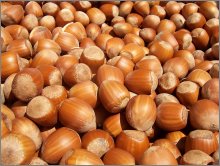 |
3. Hazelnuts (Filberts)
Hazelnuts have a strong flavor that lends itself well
to cooking and baking, which is why these nuts are often
found in cookies, candies and cakes. Nonetheless, they
are an incredibly nutritious source of dietary fiber,
vitamin E, magnesium and B vitamins. Hazelnuts also
contain phytonutrients such as arginine, an amino acid
that relaxes blood vessels, and may inhibit tumor growth
and boost immunity.
|
| |
|
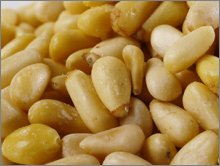 |
4. Pine Nuts
Pine nuts are technically seedlings of pinecones, not
nuts, but they have a mild, nut-like flavor and provide
excellent nutrition. Pine nuts are a rich source of
heart-healthy monounsaturated fats, and they're full
of vitamins A, C and D. Pine nuts also contain certain
fatty acids that may initiate the release of an appetite-suppressing
hormone called cholecystokinin (CCK).
|
| |
|
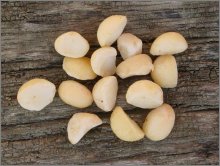 |
5. Macadamia Nuts
Macadamias taste similar to hazelnuts, but with a richer,
more buttery flavor. Though they're native to Australia,
macadamias are grown commercially in Hawaii. These nuts
are high in protein, fiber, healthy monounsaturated
fats, potassium and magnesium. And, a study done at
Hawaii University found that people who had added macadamia
nuts to their diets for just one month had total cholesterol
levels of 191, compared to 201 for those eating the
typical American diet. The largest change was found
in the LDL (bad) cholesterol.
|
| |
|
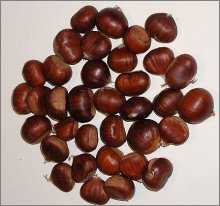 |
6. Chestnuts
Chestnuts must be boiled or roasted before you eat
them, and when you do this it brings out a sweet flavor,
and their texture becomes similar to potatoes. Chestnuts
are actually the lowest in fat of all nuts, and have
a nutritional profile similar to brown rice. They contain
as much vitamin C as lemons (by weight), lots of fiber
and about one-third the calories of peanuts and cashews.
|
Recommended Reading
Four
Healthy and Delicious Seeds Worth Snacking On
Witch
Hazel: Unnerving Name, Fantastic Health Benefits to You ...
and an Interesting Background
Sources
The
World's Healthiest Foods
To get more information about this and other highly important topics, sign up for your free subscription to our weekly SixWise.com "Be Safe, Live Long & Prosper" e-newsletter.
With every issue of the free SixWise.com newsletter, you’ll get access to the insights, products, services, and more that can truly improve your well-being, peace of mind, and therefore your life!
|
|
|
|